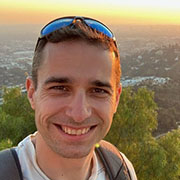A .gov website belongs to an official government organization in the United States.
A lock () or https:// means you've safely connected to the .gov website. Share sensitive information only on official, secure websites.

Human induced aerosols, such as sulphate, cool the Earth by reflecting some sunlight back to space. They also change the development and lifecycle of clouds which, in turn, regulate aerosols. Our current inability to accurately quantify these complex effects undermines our ability to attribute historical trends and accurately predict future climate changes.
Here I will describe recent work using machine learning (ML) to tackle this challenge and improve our understanding of the effects of aerosol on our climate. Firstly, by describing the use of deep neural networks to assess the prevalence of isolated cloud perturbations in petabytes of satellite imagery, and causal models which allow us to unpick the effect of aerosol on clouds directly from such observations. Secondly, by introducing the use of model emulation and extensive aerosol measurements for the improved calibration of climate models. Finally, I will discuss the potential for energy-balance emulators to provide top-down constraints that more explicitly bridge the appropriate scales and improve our ability to model these important processes.
Duncan Watson-Parris is an assistant professor at Scripps Institution of Oceanography and Halıcıoğlu Data Science Institute, UC San Diegoan. He is an atmospheric physicist working at the interface of climate research and machine learning. The Climate Analytics Lab (CAL) he leads focuses on understanding the interactions between aerosols and clouds, and their representation within global climate models. These interactions are numerous and complex, involving non-linearities and feedbacks which make modelling average responses to any perturbation in aerosol extremely challenging. CAL is leading the development of a variety of machine learning tools and techniques to alleviate these difficulties and optimally combine a variety of observational datasets, including global satellite and aircraft measurements, to constrain and improve these models. Duncan is also keen to foster the application of machine learning to climate science questions more broadly and convenes the Machine Learning for Climate Science EGU session and co-convenes the "AI and Climate Science" discovery series that is part of the United Nations' AI for Good program.
ALL Seminar attendees agree not to cite, quote, copy, or distribute material presented without the explicit written consent of the seminar presenter. Any opinions expressed in this seminar are those of the speaker alone and do not necessarily reflect the opinions of NOAA or CSL.